



The role of Laxmi, a poor, unlettered Dalit housemaid in an Andhra Pradesh village, from the late director Shyam Benegal’s iconic debut Ankur (1974), was offered to then actor-later director Aparna Sen, who was distantly related to Benegal. Benegal’s much older sister Sumitra was Sen’s mami (maternal uncle’s wife). That role eventually went to debutante Shabana Azmi, the film ushered in parallel movement in Hindi cinema, and the rest is history. This weekend, to mark Azmi’s 50 years in Indian cinema, as part of the ongoing 17th Habitat Film Festival, Sen and Azmi sat facing each other on stage, more as friends than as old colleagues, their decades-long camaraderie was palpable as the two deep-dived into a conversation — a splendid exchange of repartee — letting the audience in on the myriad behind-the-scene stories from their time together and beyond.
The two have worked on four films together till date, of which three have been directed by Aparna Sen: Sati (1989), 15 Park Avenue (2005) and Sonata (2017). And both of them acted in Mrinal Sen’s Ek Din Achanak (1989). Aparna also directed Shabana in a telefilm, Picnic (1989).
Sen was one of the four actresses, including Waheeda Rehman, to be offered Laxmi’s role before Benegal found Azmi. Sen, by her own admission, was “scared” to play a Hyderabadi servant girl who could speak a smattering of Telugu but had Benegal persuaded her, she would have agreed. Looking back, she expressed her gladness at rejecting the offer lest the film would have been a disaster, she said. And the world went on to discover Azmi, who “has been an inspiration to all actresses after her,” added Sen.
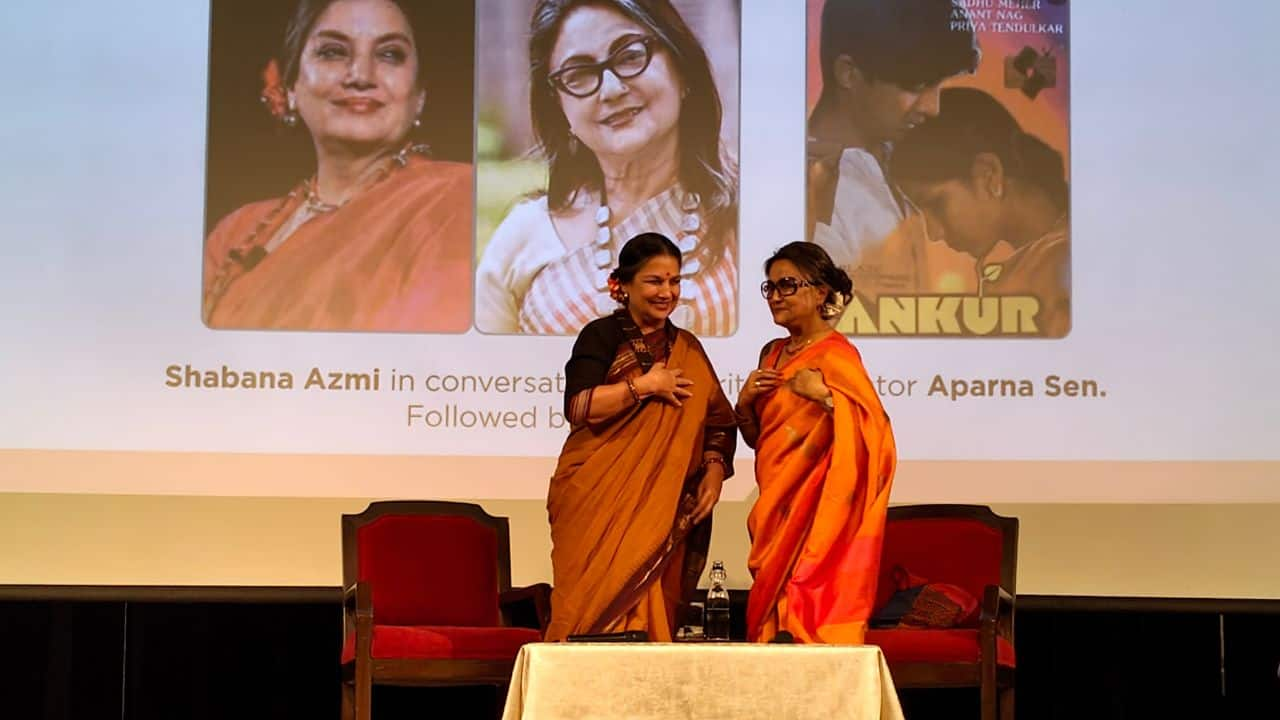 Shabana Azmi and Aparna Sen (right).
Shabana Azmi and Aparna Sen (right).
Azmi, the actor who passed out with a gold medal from the Film and Television Institute of India (FTII), Pune, didn’t speak Telugu, but she could speak Dakhani, a dialect of Urdu. The jeans-clad young Bombay girl who hadn’t entered a village until she worked in Ankur, which was shot in the Yellareddyguda village in suburban Hyderabad, was made to sit on her haunches on the floor to eat by Benegal while the rest of the crew ate at the table. Only when a local took her for an actual housemaid, did Benegal allow Azmi to have a seat at the table.
Reminiscing her days with Shyam Benegal, who passed away last year, on December 23, aged 90, she said: “Working with Shyam Benegal wasn’t working with the director. It was an exercise in knowing myself. I used to hang on to every word that Shyam used to say and it was really for me a life experience.” She recalled how her first trip abroad was with Benegal to the Berlin Film Festival, where their film was in competition, and where a young Shabana was keen on frequenting the shopping malls while Benegal would talk to the taxi driver about the gardens and the history of the place. Her perspective of viewing the world through many lenses was getting honed. “The most attractive thing about Shyam, for an actor, is you have so much faith in him that you will know he will prevent you from making a fool of yourself, so you can take many more risks. Otherwise, you sort of tend to do things that you already know, but he will allow you to break the borders and move with that confidence,” Azmi added, “and Shyam gave special attention to actors with smaller parts, who’d hang around for the entire 35-day shoot schedule even if they did just one scene.”
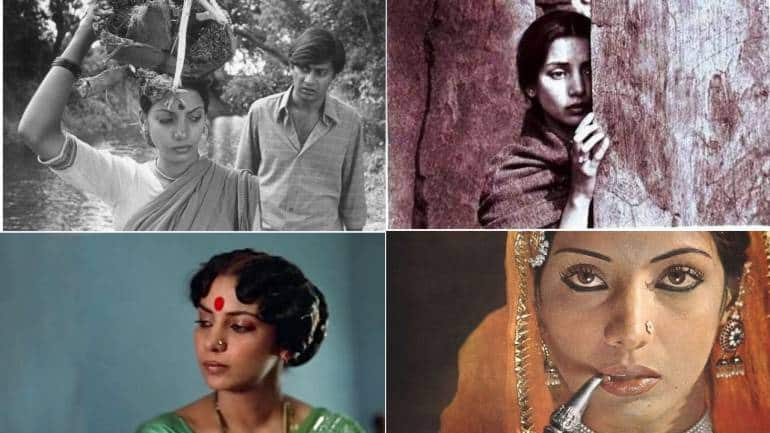 (Clockwise from top) Shabana Azmi in Ankur, Khandhar, Shatranj Ke Khilari and Mandi.
(Clockwise from top) Shabana Azmi in Ankur, Khandhar, Shatranj Ke Khilari and Mandi.
Satyajit Ray — who had given Sen her film debut with Samapti in Teen Kanya (1961) — took note of Azmi, whom he’d cast in Shatranj Ke Khilari (1977). Ray wrote in Our Films, Their Films (1976): “Shabana Azmi, who plays the farmhand’s wife, does not immediately fit into her rustic surroundings; but her poise and her personality are never in doubt, and in two high-pitched scenes she pulls out all the stops and firmly establishes herself as one of our finest dramatic actresses.” When Ray telephoned Azmi to offer her Shatranj Ke Khilari, she “almost fainted”, she recalled. When the two met at the Tehran Film Festival, they shook hands, and only when Shabana changed from jeans into the costume of Khurshid, with her posture changed, did Ray say: “All right, now you’re ready to listen.” He began with the most difficult scene first, and adviced her to rein in her tirade and bring part hurt, part anger and part sadness to Khurshid’s emotions. Azmi would have given two arms and a leg to be cast by Ray again but Ray told her: “You won’t look convincing as a Bengali.” She’d prove him wrong in the next decade when Mrinal Sen cast her in Khandhar (1984) as the lonely Jamini, trapped by her circumstances, tending to a bedridden mother. Four decades later, now as a granny on screen, her screen name Jamini would reappear in Karan Johar’s Rocky Aur Rani Kii Prem Kahaani (2023).
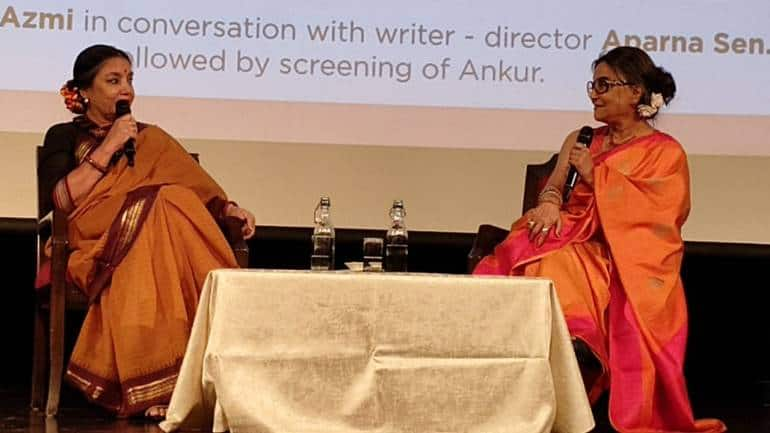 Shabana Azmi and Aparna Sen.
Shabana Azmi and Aparna Sen.
It wasn’t just Ankur that Sen let go off and Azmi stepped in. There was another film, too. British filmmaker John Schlesinger’s Shirley MacLaine-starrer Madame Sousatzka (1988), written by Ruth Prawer Jhabvala, because Sen was neck-deep in the post-production of her Azmi-starrer film Sati (1989) and recommended Azmi for the role instead, thereby being instrumental in kicking off Azmi’s “second career, in Western films,” Sen said at the session. Talking about her experience of working on that film, Azmi recalled rehearsing the same scene all day, getting cues from fellow actors in a scene, and being the only Indian on that entire set. Cut to a few years ago, on the set of Steven Spielberg’s TV series Halo (2022-24), Azmi witnessed colour-blind casting, “the whole set was a microcosm of the world because every single nationality was being represented. I felt so good because Asian actors have been saying for such a long time that we need colour-blind casting. Why should we be only defined by ethnicity?” she said as Sen quipped that that was something she experienced in Peter Brook’s Mahabharata (1989), “where you had a white Krishna; it doesn’t matter whether he’s white or black because the weight of Krishna’s experience came out through those eyes,” Sen added.
Much before Sen cast Azmi in her films, she admits to having been bowled over by Azmi’s “virtuoso performance” in Mahesh Bhatt’s Arth (1982). “That telephone scene still haunts me,” said Sen. In the scene, Azmi’s Pooja is begging for her husband Inder (Kulbhushan Kharbanda) from his mistress Smita Patil’s Kavita. The actors were given the scene at that moment, when a disagreement arose between Azmi and Bhatt, he responded with “there’s no time for artificial conflict.” Thrust into the scene — a deeply humiliating one for her character Pooja — followed with a mechanical rehearsal, Azmi delivered it in the first take, in 10 minutes, and then walked out crying all the way, deeply hurt, “because you suddenly get in touch with that part within you which you don’t want to…to look for that emotion…but an actor’s resource base is life and life as connected to you,” said Azmi. Sen credits Azmi, recounting that “she prepares for her role but when she comes in front of the camera, all that preparation is kept aside and instinct comes to the fore.” Azmi had an emotional encounter when playing Jamini in Khandhar as well, and had told Sen that she wanted to “hold Jamini tight”. Empathy for the character one is essaying is the hallmark of a great actor. “No actor can rise above the character,” Azmi said.
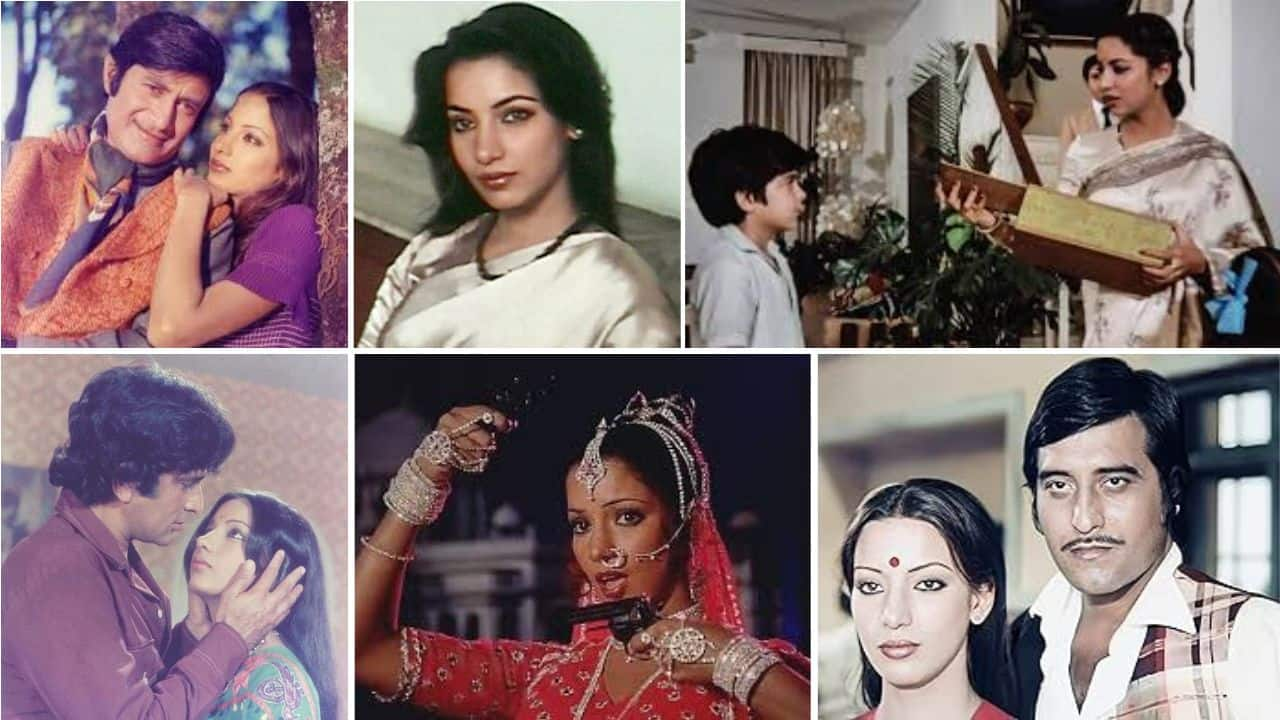 (Clockwise from top) Shabana Azmi in Ishk Ishk Ishk, Arth, Masoom, Amar Akbar Anthony, Parvarish, and Fakira.
(Clockwise from top) Shabana Azmi in Ishk Ishk Ishk, Arth, Masoom, Amar Akbar Anthony, Parvarish, and Fakira.
An actor, however, has to go through a lot for her character. Even face humiliation in real life. For Manmohan Desai’s Parvarish (1977), a snarky taunt by choreographer Kamal Master, in front of hundreds of junior artistes, had almost sent a chastised Azmi into hanging up her boots. With two left feet and revolvers in hands, Azmi had requested for a step change in a song sequence with Neetu Singh. Azmi, who walked home crying, could be talked sense into only by Sulakshana Pandit — whose beauty Azmi desired to imbibe — and the career of a brilliant artiste was thus salvaged. That same year, Azmi also featured in Desai’s Amar Akbar Anthony. “Manmohan Desai was great to work with. He’d say, come and say your dialogues quickly, don’t do Satyajit Ray style of acting. So, one day, he came to me and said he was producing a film [Amar Akbar Anthony], and that he doesn’t have a role for me but Vinod Khanna prodded him to get him a [screen] girlfriend since his co-actors Rishi Kapoor and Amitabh Bachchan have female counterparts, and that is how he included me in the film. I immediately agreed because I liked his honesty,” said Azmi.
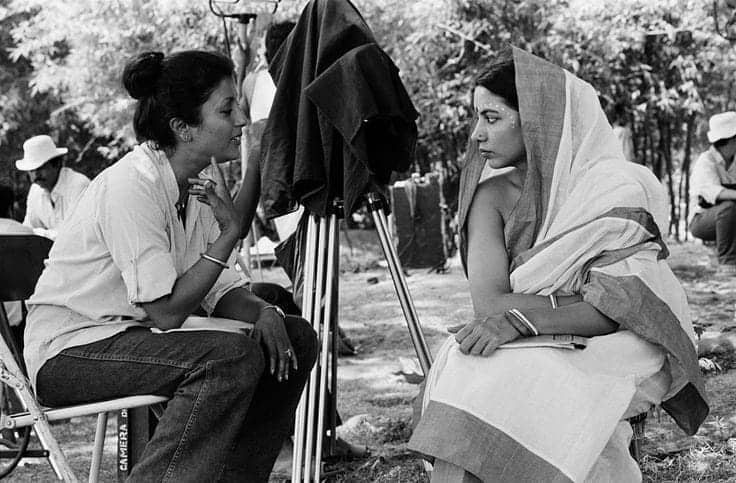 Director Aparna Sen (left) and actor Shabana Azmi on the sets of 'Sati' (1989). (Photo via Instagram)
Director Aparna Sen (left) and actor Shabana Azmi on the sets of 'Sati' (1989). (Photo via Instagram)
In Sen’s Sati (1989), Azmi played Uma, a mute Bengali girl married to a tree. Azmi had played a mute character in Gulzar’s Namkeen (1982), too. Azmi had written a letter to Sen expressing her desire to work with her when she learnt that Sen was making a film for Motilal Padri. That film never happened. But Sati did. The director and her actor were poles apart on how they saw the character of Uma — Azmi saw her as a bull while Sen sketched her as a fox. Sen shot both versions and let Azmi see the rushes and take a call. But most of all both recall this one moment when a huge storm hit the village they were shooting in and all the villagers had scuttled indoors, and the banyan tree began to sway. Eminent cinematographer Ashok Mehta and Azmi slipped out to shoot in the storm when Sen screamed at the two: “Come back right now. I’m the director and I’m saying, there is something better than good cinema, human life for instance,” Azmi regaled the story about Sen’s affinity for quaint English and broke into a series of chuckles.
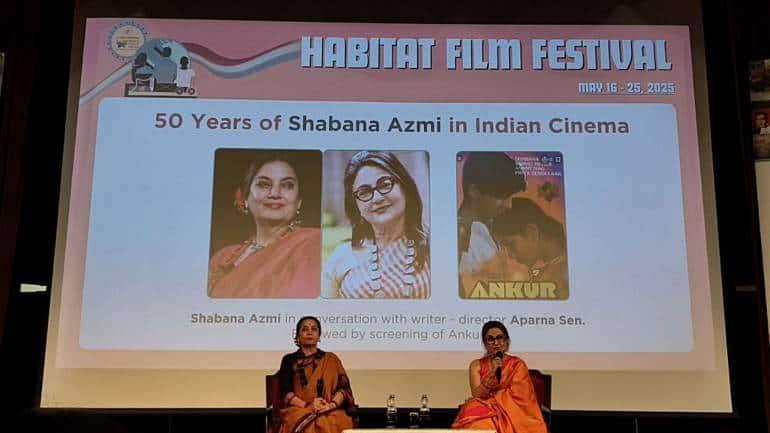 Shabana Azmi and Aparna Sen.
Shabana Azmi and Aparna Sen.
There was another film, a telefilm for Doordarshan, by Sen, called Picnic (1989) — now lost forever — which starred Azmi alongside Shreeram Lagoo, Farooq Shaikh, Farida Jalal, Sreela Majumdar and a 10-year-old Konkona Sensharma. Sen also recounted in jest how Azmi elbowed her way into 15 Park Avenue (2005) by lying about the fact that she could drive. It was during the shooting of Picnic that Sen learnt Azmi can sing well and years later, made her sing — a difficult Rabindrasangeet song Aaji jhorer raate — in the chamber drama Sonata (2017). That two-minutes of singing was “so painful, it was the most challenging thing I had ever done in my entire life,” said Azmi, adding how Javed Akhtar was supportive and said he’d pay for another shoot schedule if need be if the producer can’t pay because Azmi wasn’t happy with her take.
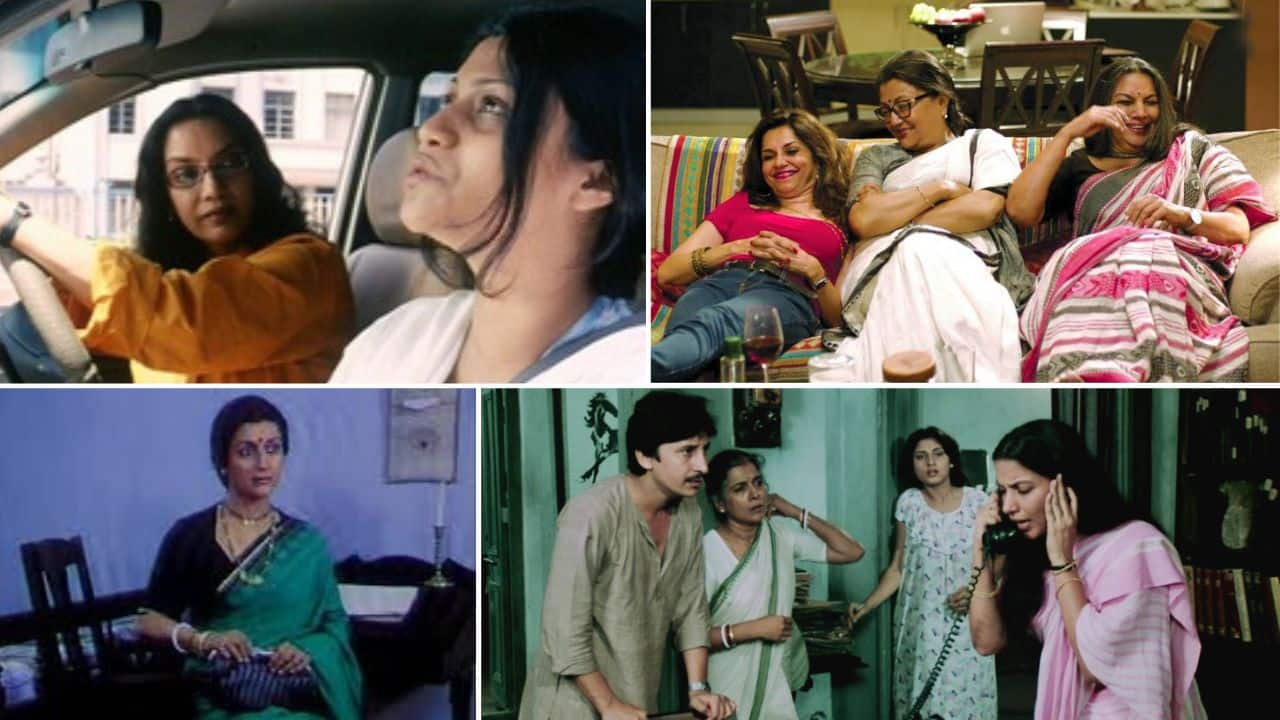 (Clockwise from top) Shabana Azmi in 15 Park Avenue, Sonata, and Ek Din Achanak; Aparna Sen in Ek Din Achanak.
(Clockwise from top) Shabana Azmi in 15 Park Avenue, Sonata, and Ek Din Achanak; Aparna Sen in Ek Din Achanak.
Azmi grew up in a commune of eight families, to parents who upheld the Left ideology. From that background to coming into and embracing mainstream Hindi cinema was quite an arc. Both Sen and Azmi realised through their own professional journeys as actors that “you can’t have a career without doing mainstream cinema.” Azmi balanced both succesfully. How did she manage both? “It’s a real suspension of disbelief, otherwise it was impossible,” Azmi concurred. Her first mainstream commercial film was Dev Anand’s Ishk Ishk Ishk (1974) followed by the Shashi Kapoor-starrer Fakira (1976). “They became huge successes in spite of me, not because of me,” she said, adding, “This thought must have occurred to me that if I become a star in the commercial sense, it will help the other films that I was doing because maybe then people would be persuaded to come [and do arthouse films].” To this Sen added that while she could only offer a little sum of Rs 2 lakh to Azmi for 15 Park Avenue, the latter refused to take a single penny for the film, and added: “Think of it as my contribution to good cinema,” Azmi had told Sen.
Discover the latest Business News, Sensex, and Nifty updates. Obtain Personal Finance insights, tax queries, and expert opinions on Moneycontrol or download the Moneycontrol App to stay updated!
Find the best of Al News in one place, specially curated for you every weekend.
Stay on top of the latest tech trends and biggest startup news.